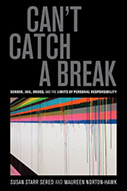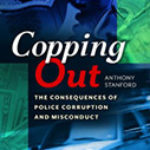Can’t Catch a Break: Gender, Jail, Drugs, and the Limits of Personal Responsibility

Authors: Susan Starr Sered and Maureen Norton-Hawk
Publisher: Berkeley, CA: University of California Press, 2014. 232p.
Reviewer: Dana DeHart | January 2015
In Can’t Catch a Break: Gender, Jail, Drugs, and the Limits of Personal Responsibility, Susan Starr Sered and Maureen Norton-Hawk describe their study of 47 women at a Boston halfway house for women on parole, and a nearby drop-in center for poor and homeless women. The five-year longitudinal study examined how criminalized women navigate and interpret the world around them. Using ethnographic methods and a sociological and anthropological framework, Sered and Norton-Hawk met with the women monthly, with structured interviews at three-month intervals to explore topics such as housing, finances, employment, family, relationships, and health. Over half of the women remained in the study more than four years, providing a valuable glimpse at cycles of hope and despair as the women churned through both the halfway house and drop-in center repeatedly. Sered and Norton-Hawk caution the reader up front that there are no happy endings in this book—the structural inequalities in these women’s lives prevent the women from ever reaching stability. The authors bring together an impressive breadth of research to offer a comprehensive view of the many challenges faced by disadvantaged women: violence, poverty, oppression, health and mental health struggles, addiction, incarceration, and the deluded preachings of religious self-help groups. The central message of the book is that we as a society cannot rely on personal choice as an explanatory framework for human suffering. We cannot personalize the political as we commonly do through criminalization and medicalization. Pain and affliction are not consequences of individual choice, but rather result from larger structural and societal institutions of sexism, racism, and classism. Sered and Norton-Hawk acknowledge that some choices are poorly executed, but that this alone is not the cause of these human conditions. Privileges such as perseverance and resourcefulness are gradually depleted in the face of so much adversity. The authors have done a nice job of reinforcing these ideas with compelling stories drawn from their extensive interaction with the women. In fact, the book is sufficiently engaging that I finished it on one leg of a domestic cross-country flight in the U.S. Can’t Catch a Break is a thorough yet concise testament to the social inequalities that drive mass incarceration. The book would be a powerful addition to coursework in criminology, women’s studies, psychology, social work, and public health.
Dana DeHart – University of South Carolina, College of Social Work


